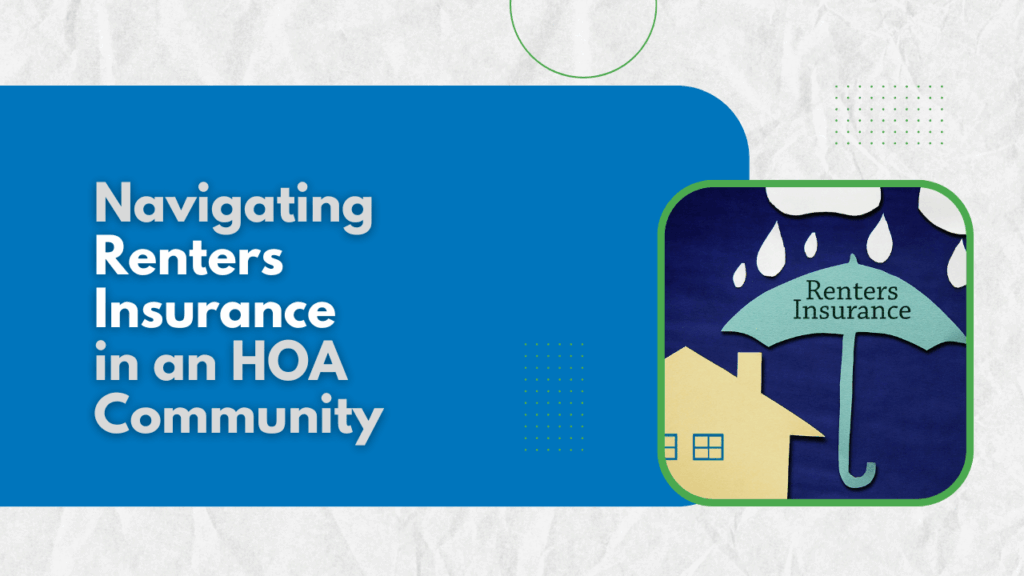
Renters insurance is not a legal requirement in North Carolina, but as anyone renting out a property knows, it’s an excellent idea to require it in a lease agreement. These are unpredictable, risky times and a landlord’s insurance policy is not going to cover the damage to personal possessions belonging to a tenant.
Renting out a property in an HOA changes the dynamic a little bit. Not only is there the landlord and the tenant to consider, but also the community as a whole and the association as another interested party that may or may not be affected if there’s a loss that’s the fault of a tenant renting a home in that community.
Who is responsible for what? Which insurance policies will cover damages and loss first? Who needs to be insured and who ought to be included on a renters insurance policy?
All of these questions are good ones, and we’ll approach the answers here, based on our experience as Winston-Salem HOA managers and property managers. We aren’t insurance agents. We aren’t actuary professionals. And, we’re not lawyers. But, this is what we can tell you about navigating renters insurance in an HOA community.
What is Renters Insurance and Should Landlords Require it?
Let’s start with understanding what renters insurance is, and what it covers.
Protecting your real estate investment is an important priority for most rental owners, and one way to ensure everything possible is being done to safeguard the condition and value of a property is to require residents to have renters insurance.
Renters insurance provides coverage for personal property and liability for the tenants who are living in your rental home. A lot of landlords complain to us that it can be difficult to enforce that tenants hold a renters insurance policy, but it’s actually not too difficult to enforce this requirement, and we think it’s a good idea to ask for proof of insurance before a new tenant moves in or an existing resident renews a lease agreement.
Here are two reasons that explain why it’s so important to you and your investment property.
|
Renters Insurance Protects Your Winston-Salem Investment Property While the insurance policy that landlords and rental property owners buy for their properties will cover damages to the property itself, it does not protect any of the tenant’s personal belongings or assets in the case of a covered loss such as theft, fire, or natural disasters. Requiring renters insurance ensures that residents have coverage for their personal property, and it allows them to file any claims through their own insurance carrier rather than through your insurance policy. This is an important way to limit your own liability while also ensuring that your residents are adequately protected. |
Renters Insurance Protects Residents from Liability Claims In addition to providing coverage for personal belongings, renters insurance also protects your tenants from liability claims. Here’s an example: let’s say a tenant leaves a pot on a hot stove, and once all of the food or liquid in that pot has burned off, a small kitchen fire could start. This accident is due to their negligence, so their policy will cover the cost of repairs instead of yours. Without renters insurance, those tenants renting from you would be responsible for making the repairs on their own, and they may not have the money available for such an expense, which means you would have to step in to cover the costs. |
Making the Case: How to Educate HOA Rental Residents on the Importance of Insurance

This shouldn’t be a hard sell when you have a new tenant preparing to move into a property that you’re renting them. The insurance policy itself provides a lot of benefits and protections for your resident, and it’s not expensive at all. Most policies will cost between $15 and $20 a month. That’s not too much to pay for a lot of peace of mind.
It’s always a good idea to point out the personal advantages that your tenant will access. Explain that if there’s a flood and their expensive electronics get damaged, your policy will not cover that loss. They should see the importance of renters insurance and they will also likely understand that it’s common in rental homes. Most places today require renters insurance from residents, so this should not be a deal breaker when someone is deciding whether or not to rent your property.
This type of insurance can actually save real estate investors money over time. By ensuring that residents have insurance, you’ll limit your liability and reduce your risk. It’s less likely that you’ll have to pay for damages or repairs out of pocket. This can help you earn more in the short and long term.
Requiring renters insurance is an important and necessary way to protect your property and your peace of mind. Write the requirement into your lease agreement, and ask to see proof of insurance before move-in. You can also ask to be listed as an additional insured, which will not cost the resident any additional money, and will keep you informed when the policy renews, changes, or cancels. We will talk more about additional insured requirements later on, so stay with us.
HOA Properties in Winston-Salem and Insurance Requirements
Anyone who owns rental properties in HOAs must have an understanding about the coverage that already exists for that property. Don’t buy a home that you intend to use as a rental without understanding what coverage is provided by the master insurance policy for the HOA.
We cannot speak for all associations, but in our experience, the HOA’s master policy typically covers the exterior of the dwelling unit and the community’s common areas. This might include the entrance at the security gate, any clubhouses or social spaces, pool areas, or parks.
However, this policy typically doesn’t cover anything inside the unit, whether it’s a condo, an attached townhome, or a single-family home. Therefore, rental property owners must purchase supplemental policies to cover everything inside, from the drywall and flooring to the light fixtures and appliances. Even if your tenant doesn’t cause any damage and liability is not an issue, there may be repairs needed that the community policy will not cover. Let’s say there’s a flood or a fire that starts in another home but impacts yours. If you don’t have coverage for the interior of your unit, you’ll be responsible for paying for repairs. If your tenant does not have renters insurance, they will have to pay to replace their own phones, clothing, and furniture.
We believe it’s better to be prepared when protecting your investment.
Never Rely Only on Your HOA to Protect Your Rental Property
Many homeowners and investors mistakenly believe that if they live in an HOA community, they don’t need to buy their own insurance policies. While it’s true that part of your HOA dues goes towards communal insurance, individual homeowners must still have their own coverage, as we have already discussed.
The same principle applies to rental property owners in HOAs—they need separate insurance policies.
Typically, HOA insurance policies do not cover rental properties. For this reason, landlords are obligated to purchase either homeowners or landlord insurance, depending on their situation. Homeowners insurance might suffice for those renting out a single room in their residence, for example. However, renting out entire homes or condo units requires landlord insurance.
In addition to securing their own insurance, landlords should also ensure that their tenants have adequate coverage. Remember that landlord insurance doesn’t usually protect a tenant’s personal belongings, and that’s why you want to require those renters policies.
North Carolina Coverage Requirements for Your Rental Property
The standard liability coverage in North Carolina for real estate is $300,000. This sounds like a lot of money, however we always recommend that real estate investors purchase at least $1,000,000 in liability coverage for a rental property.
This is from a standpoint of eliminating risk and reducing the chance that you could be bankrupted with a claim. If you don’t have enough insurance and a large claim is made and won against you, that law will require you to pay the additional amount out of pocket.
When you don’t have enough to cover that, it’s possible the courts could garnish your wages. A judgment could potentially be placed against your personal home or other assets such as additional rental properties. To avoid these potential consequences, it’s best to ensure you’re fully protected with more liability insurance than you think you need.
Additional Insured: What this Means and How it Helps

Navigating the intricacies of a renters insurance policy is often confusing enough, and that’s why we’ve taken so much time talking about them. Within a policy, there’s a term that often arises: “additional insured.” Understanding this concept is crucial when you’re trying to protect your investments and mitigate potential risks. Sometimes an HOA will also have an interest in being an additional insured, so we want to talk about this term a little bit.
What is an Additional Insured?
An additional insured is a person or entity added to a renters insurance policy who receives protection under the terms of that policy. By including an additional insured, the policy extends its liability coverage to another party—typically one that might potentially be held liable for incidents involving the renters property. That party could be the property owner. Or the association.
Why Should Landlords Care About Being an Additional Insured?
Here are three big reasons.
| Liability Protection
As a landlord, you can be held accountable for incidents that occur on your property, whether or not they result from your direct action or negligence. By being listed as an additional insured on your tenant’s policy, you add an extra layer of protection against potential lawsuits arising from accidents or damage involving the tenant’s activities. |
| Peace of Mind
Knowing that you’re protected under your tenant’s policy can help reduce anxiety and foster a more trusting relationship between you and your renters. This approach demonstrates due diligence and responsibility on your part, showcasing your commitment to safeguarding your property and those who inhabit it. |
| Risk Mitigation
Including yourself as an additional insured can effectively spread the risk across both parties, ensuring that both you and your tenant are taking appropriate steps to prevent financial loss in case of an incident. |
How to Ensure You’re Covered as an Additional Insured
Keep everyone and everything on the same page by being added to the policy as an additional insured. This can be implemented in a few key ways:
- Communicate with Your Tenant. Start by discussing the importance of renters insurance with your tenant and explain why you’d like to be an additional insured. Provide them with specific information about what being an additional insured entails and how it benefits both parties. They might be concerned that the cost will go up, but that’s not likely to be the case.
- Review the Policy. Once your tenant agrees to add you as an additional insured, request a copy of the policy details for your review. Ensure that your name and role are correctly listed and confirm that the coverage offered meets your expectations.
- Update Lease Agreements. Consider including a clause in your lease agreements that requires tenants to list you as an additional insured on their renter’s policy. This measure helps set clear expectations and establishes a consistent framework for all tenants moving forward.
- Consult with an Insurance Professional. If you’re unsure about the specifics of being an additional insured or want to ensure the legality and appropriateness of your actions, consult with an insurance professional. They can provide valuable guidance and advice tailored to your unique situation.
HOA rules and regulations may also require that the association be named as an additional insured. Understand HOA policies around this. Familiarize yourself with your HOA’s insurance requirements for renters. This could include minimum coverage limits or additional insured mandates.
Always stay informed. Insurance policies can vary significantly. Regularly review your renters insurance and any HOA updates or changes to policies. Work with professionals, always. Consult with insurance professionals or legal advisors for guidance tailored to your specific situation and property. By understanding the nuances of renters insurance and the role of additional insureds within your HOA, you can better protect yourself, your rental property, and contribute to a harmonious community environment.
Incorporating the additional insured clause into a renters insurance strategy is a proactive measure to protect owners, tenants, HOAs, and investment properties. By understanding and utilizing this option, it is much easier to mitigate risks, enhance liability protection, and promote a harmonious landlord-tenant-HOA relationship. Prioritizing comprehensive coverage strengthens your role as a responsible property owner and ensures you and your tenants are well-prepared for any unexpected events.
A Note about Self-Insurance
An industry trend that’s out there right now is self-insurance. This can mean a number of things. It can mean that a rental property owner provides insurance-type protection to tenants instead of the tenants buying a traditional renters insurance policy. It can also mean tenants protecting themselves by self-insuring.
This is a risk management strategy where individuals set aside funds to cover potential losses instead of paying premiums to an insurance company. For renters, this means creating a dedicated fund to cover personal property damage or liability claims rather than purchasing a traditional renters insurance policy. For landlords, it means being prepared to pay any claim tenants might make for damage of their belongings at the property.
One of the biggest draws of self-insurance is the potential cost savings. Renters can avoid monthly premiums and insurance company profits by putting money into a personal emergency fund, which can be particularly appealing for those trying to manage tight budgets. Landlords like it because it provides complete control over the property and how and when repairs are made or claims are honored. Instead of being bound by the stipulations of an insurance policy, they can tailor their funds to cover specific risks they deem most relevant.
While self-insurance presents an intriguing alternative to traditional renters insurance, it requires careful consideration and clear communication between landlords and tenants. This might work under a number of different scenarios. In an HOA, however, it’s risky. The HOA may not even allow it, and if they don’t, there are some very compelling reasons for why they wouldn’t.
Insurance is absolutely crucial to rental property owners and real estate investors of any kind. When you own investment property, you want to protect it. When you’re renting that investment property out to tenants, there’s extra liability and risk. It has to be covered. When your rental is in an HOA, there’s also the association to think about, and any of its rules and requirements.
We’ve covered a lot, but there’s always more to talk about. Capstone Realty Consultants can help with the insurance regulations of your Greensboro or Winston-Salem rental property in an HOA. Please contact us to talk about how we can protect your property and your association.
